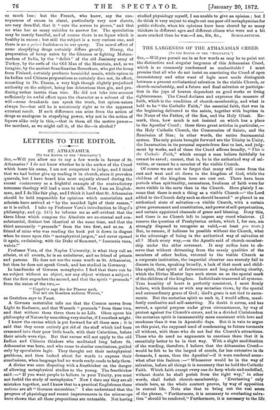LETTERS TO THE EDITOR.
ST. ATHANASIUS.
[TO THE EDITOR OF THE "SPECTATOR.']
Sru,—Will you allow me to say a few words in favour of St. Athanasius ? I do not know whether he is the author of the Creed which bears his ,name, I am not competent to judge, and I think that we had better give up reading it in church, since it provokes quarrels, but I have heard him most unjustly abused during the recent controversy as a frightful example of the contradictory nonsense theology will lead a man to talk. Now, I am an English- man, and I do like fair play, and I think it hard that St. Athanasius should be held responsible for opinions which materialists and atheists have arrived at "by the unaided light of their reason," as it is called. I take up Professor Vera's introduction to Hegel's philosophy, and (p. 245) he informs me as self-evident that the three Ideas which compose the Absolute are co-eternal and con- substantial, distinct but identical at the same time, and that the third necessarily " proceeds " from the two first, and so on. A friend of mine who was reading the book put it down in disgust when he came upon this "metaphysical jargon," and never opened it again, exclaiming, with the Duke of Somerset, "Insomnia vane, valeta!"
Professor Vera, of the Naples University, is what they call an atheist, at all events, he is an unbeliever, and no friend of priests and parsons. He does not use the same words as St. Athanasius, but then he does not speak Greek, and has studied in Germany.
In handbooks of German metaphysics I find that there can be no subject without an object, nor any object without a subject ; that the first engenders the second, and that the spirit " proceeds " from the union of the two,—
" Ungefihr sagt das der Pfarrer such,
Nur mit sin bisschen anderen Worten," as Gretchen says to Faust.
A German materialist tells me that the Cosmos moves from Light to Radiance, and that Warmth " proceeds" from these two, and that without these three there is no Life. Oken opens his philosophy of Nature by something very-similar, if I recollect aright.
I know the excuse which is put forward for all these men ; it is said that they never entirely got rid of the stuff which had been crammed into their poor little heads, with their Catechism, before their minds were ripe. But that excuse will not apply to the old Indian and Chinese thinkers who meditated long before St. Athanasius was born, and who came to similar conclusions, guided only by speculative logic. They thought out their metaphysical problems, and then looked about for words to express their conclusions, when language had no words ready-made to help them.
A divine was once disputing with a freethinker on the danger of allowing metaphysical studies to the young. The freethinker said :—" If you want people to believe in your Trinity, you must not forbid the study of metaphysics." Now I dare say they are all mistaken together, and I know that to a practical Englishman these notions are all "German moonshine." I also understand that the progress of physiology and recent improvements in the microscope have shown that all these propositions are untenable. Not having studied physiology myself, I am unable to give an opinion ; but I do think it very unjust to single out one poor old metaphysician for public ridicule, when his opinions have been shared by so many thinkers in different ages and different climes who were not a bit
more cracked than he was.—I am, Sir, &c., SCEEOLASTICOS.


































 Previous page
Previous page